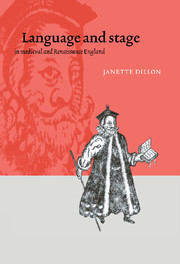4 - The controlling state
Published online by Cambridge University Press: 15 January 2010
Summary
Mankind, in attempting to free language from its entrapment in the antagonism between heresy and religious orthodoxy, did not point towards the shape of things to come. Instead, the formulation of linguistic thinking in terms of fixed theological and political positions increasingly hardened into a simplistic polemic that cast English as the language of radicalism and Latin as the language of a conservative establishment. Symbiotic relations between the two languages remained as crucial as in the medieval period, but changing conceptions of each were developing. Whereas most medieval writers had perceived English as the barbarian other defining the authoritative, unitary discourse of Latin, Tudor Reformers were refining the Lollard position that produced English as the plain language for plain truth. Against this conception of English, Latin appeared less a barbarian than a demon. As English, in Reformed discourse, strove to usurp the place of Latin as the language of truth, it had to wrestle with an enemy whose claim to power rested on centuries of dominance. English had had the status of a poor language, hitherto thought unsuitable for truth because inadequate to its complexities; but Latin, smooth, eloquent and highly sophisticated, now seemed to threaten truth by virtue of the very assurance of its rhetoric and the glitter of its surface. Its danger lay not in the possibility of its inadequacy but in its capacity for deliberate deception.
AN ENGLISH BIBLE
As in the late fourteenth century, the focal issue in this hardening of a new polarisation was the question of an English bible.
- Type
- Chapter
- Information
- Language and Stage in Medieval and Renaissance England , pp. 70 - 105Publisher: Cambridge University PressPrint publication year: 1998



